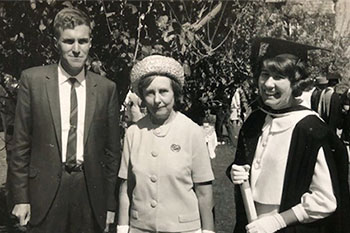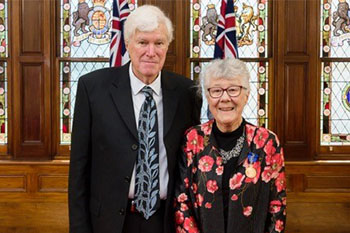Jennie and Bob Teasdale
In February 2020, locals and UNE alumni Jennie and Bob Teasdale brought us news of the devastating fires that razed half of Kangaroo Island. Jennie and Bob met at UNE in 1965 and married in Armidale early the following year. During 53 years of marriage, the couple has worked as educators around the world. Now they are bringing their accumulated experience and sensitivity to the recovery of the island, which is home to some 18 UNE graduates.


Rising from the ashes
Winter is approaching on Kangaroo Island, drought persists and COVID-19 has brought extra heartache to residents still living in makeshift accommodation on blackened fire grounds. Yet the spirit and determination of this close-knit community is paramount.
"We have formed five recovery working groups - responsible for health and wellbeing, the environment, infrastructure, tourism and small business, and the primary industry sector," says Jennie, who is a member of the environment group.
Deputy Mayor Bob, who is chair of the health and wellbeing recovery group, says the South Australian Government has fully funded the clean-up of all 89 damaged properties, temporary housing is being installed, and overall there is a real forward momentum.
"Donations to the Mayoral Recovery Fund were well above $5 million and most of that money has now been distributed to members of the community to help them rebuild their lives," he says. "But the COVID-19 social isolation requirements could not have come at a worse time because people need, more than anything, to be part of social networks and doing things together, and we can't. They also need one-on-one counselling and health services, but specialists cannot easily visit the island. It's a deeply challenging time."
Some personal counselling is being provided via telehealth, but it is hampered by poor wi-fi reception on the worst affected, western end of the island. And Bob says news that ferry and airline services are to be severely cut back contributes further to feelings of isolation.
"Rex Airlines has reduced its services from twice a day to twice a week, and we now have just one instead of two ferries operating daily," he says. "While we don't want visitors, we do need trucks on the ferries bringing essential housing, building and fencing equipment, and stock to replace what has been lost."
Jennie and Bob moved to the island in 2007, built their ecologically-sensitive home on the shores of a pristine tidal lagoon, and have planted over 12,000 trees on their 53-hectare property. They consider themselves very fortunate not to have been personally impacted by the fire. "It gives us a tranquil base to come home to, and the capacity to give more to those who have lost so much," Jennie says. "Those of us who are okay have a deeper responsibility to help those who aren't," Bob adds.
As respected community leaders, the couple swiftly established the Kangaroo Island Children’s Bushfire Fund in the immediate aftermath of the fires. It has raised about $45,000 for the Parndana school campus, in the middle of the fire grounds, where almost 90% of students come from severely impacted families. The fund is still open for contributions. "One-third of the children, and several of the teachers, lost everything," Jennie says. "We're working with the campus head to provide resources for the school and to support the emotional wellbeing of the young people, and there are some wonderful ideas emerging."
Burnt home sites have been cleared, insurance claims assessed, Blaze Aid has been helping to reconstruct fences, and temporary housing is being provided. Most farmers are beginning to restock, but containment feeding has created an urgent need for stock feed. This is where another UNE alumnus, Deane Crabb, head of Livestock South Australia, came into the picture.
"Livestock South Australia took responsibility for managing the supply of donated feed," Jennie says. “Deane has organised thousands and thousands of bales of feed to be transported to Cape Jervis and on to the ferry, mainly on night runs carrying B-doubles loaded with nothing but hay."
On a recent picnic with UNE alumni Doug Gray and Annabel Douglas-Hill on their burnt-out Karatta property, Jennie and Bob were thrilled to see regrowth on eucalyptus trees, wallabies grazing, parrots looking for a nesting site, and tadpoles emerging in a creek. "The bush is silently recovering," Jennie says, “without a fanfare”.
The environment committee is taking full advantage of the burnt-out country to expedite feral animal eradication. Large numbers of wild pigs have already been removed and feral cats are now in their sights. "We are also focusing on regrowing native vegetation along creek beds so we have clean drinking water and refuges for animals," Jennie says. "And the exciting thing is that we have everyone from oldies and young people to farmers and school students - the future inheritors of the island - working together."
Bob says the fires have brought the community together, but that cohesion will be tested in the months ahead. "The fires have revealed the resilience and compassion of our community but we're into the really hard part now," he says. "We're going to need care, support and engagement to continue."
Still, the couple remains positive. "The community has been mobilised into purposeful action and there is a willingness to help those who are limping," Jennie says. "Bob and I feel privileged that we're in a position to help."

